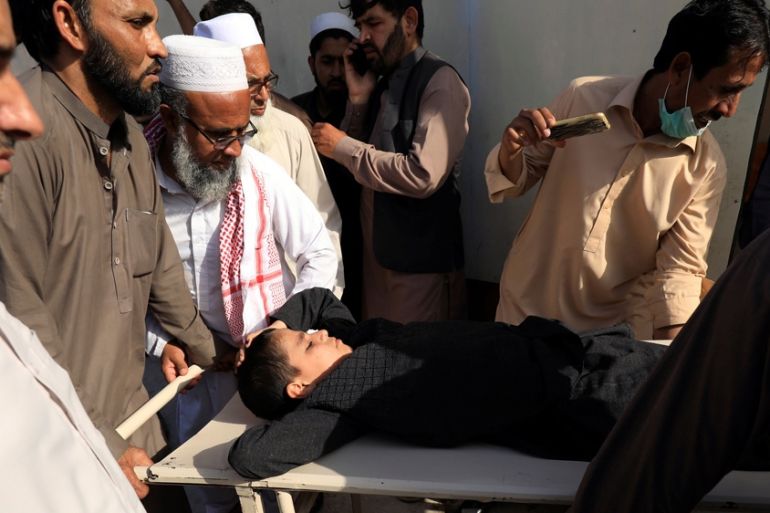Gunmen kill polio vaccinator in southwestern Pakistan
Attack on vaccination team raises toll in similar attacks since 2012 to at least 95, according to an Al Jazeera tally.

Islamabad, Pakistan – Unidentified gunmen have killed at least one polio vaccination worker in the southwestern Pakistani area of Chaman, government officials say, bringing the death toll from a drive this week to eradicate the virus to at least three.
Gunmen opened fire on a team of vaccination workers in the remote village of Sultan Zai, about 100km northwest of the provincial capital Quetta, on Thursday, said Sami Agha, a local government official.
Keep reading
list of 4 itemsWhat is behind the insulin shortage in the US?
Deaf Syrian boy hears for first time after life-changing operation
Aslan, a little Syrian boy’s journey to hear again
“The body of the killed polio worker and another person who was wounded have been transferred to hospital,” Agha said in a statement.
Security forces have launched a search operation in the area, and the polio vaccination drive in near Sultan Zai has been temporarily suspended, the statement said.
Polio, a highly infectious debilitating virus that targets the nervous system of children, has been wiped out across the world, but remains endemic in Pakistan, Afghanistan and Nigeria.
Vaccination drives in Pakistan have been consistently targeted by misinformation and violent attacks on polio vaccinators and the policemen who guard them.
The attack on Thursday came after two policemen who were guarding vaccinators were killed in separate incidents in the northern districts of Bannu and Buner earlier in the week.
This week’s violence brings the death toll from attacks targeting polio vaccination teams in the South Asian country to at least 95 since 2012, according to an Al Jazeera tally.
Misinformation and rumours
Last year, of 33 worldwide cases of polio reported by the Global Polio Eradication Initiative (GPEI), 12 were reported in Pakistan. The remaining 21 cases were reported from neighbouring Afghanistan.
Sultan Zai, where Thursday’s attack took place, is located on the border between the two countries.
This year, at least six cases of polio have been reported in Pakistan, according to a World Health Organization data.
That number is a significant reduction from the 306 cases reported in 2014, but the virus remains a significant threat to the unvaccinated, with environmental samples across the country regularly showing signs of it.
Polio vaccination campaigns in Pakistan have often been the subject of misinformation, with parents concerned about rumours that the vaccines would either neuter their children or harm them in some other way.
On Monday, an angry mob burned down a government health facility in the northern district of Peshawar, after rumours spread that children administered the polio vaccine had begun to fall sick.
Hundreds of children were brought to Peshawar hospitals as hysteria gripped parents in the area, the local Dawn newspaper reported.
Pakistani officials say a certain degree of resistance is expected among the targeted communities, with roughly 400,000 children missed due to parental refusal in each vaccination drive cycle. Roughly 39.4 million children are targeted in each vaccination cycle, according to the government data.
“We expected [refusals], but we did not realise that people would panic and that something like this would also happen,” Babar bin Atta, the Pakistani prime minister’s focal person for polio eradication told Al Jazeera.
“We have to run very aggressive perception management campaigns [to combat misinformation],” he said.
“We had planned for the next polio campaign to be at the end of June. That gives us some time to work on this.”
Atta said at least 262,000 polio vaccination workers and 151,000 security personnel were taking part in this week’s polio vaccination drive across the country, which remained ongoing.
Asad Hashim is Al Jazeera’s digital correspondent in Pakistan. He tweets @AsadHashim.
Saadullah Akhtar contributed additional reporting from Quetta.